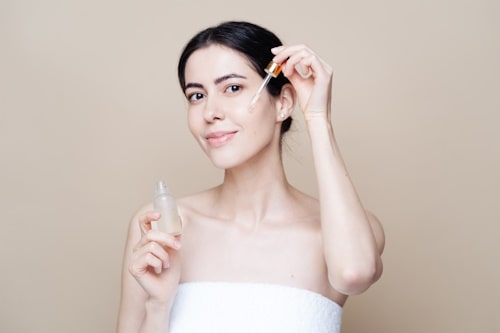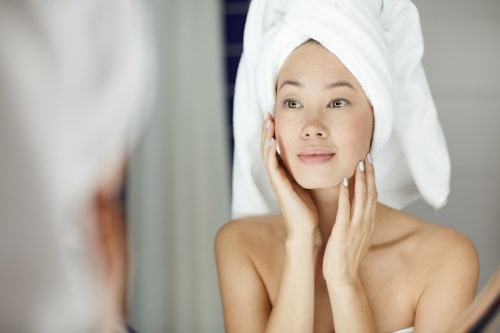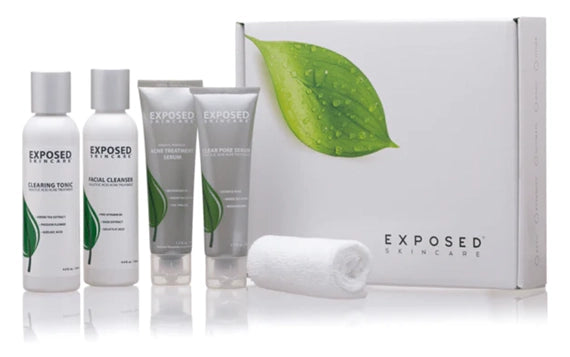Struggling with hormonal acne can feel like a never-ending battle. For many women, this common skin condition is more than just a few pimples—it's a persistent issue that affects self-esteem and quality of life.
This article delves into the best hormonal acne treatment for women, addressing various aspects like hormonal fluctuations, sebum production, and the role of androgens. We will explore a range of treatments and provide insights on managing and treating hormonal acne effectively.
Also read: How to choose the best acne treatment
Biggest Take-Aways:
- Hormonal fluctuations are a major contributor to acne in women, often leading to persistent and stubborn breakouts.
- Treatments like spironolactone and birth control pills can be highly effective in balancing hormones and reducing acne severity.
- A holistic approach, including lifestyle modifications and a consistent skincare regimen, is crucial in managing hormonal acne effectively.
- Exposed Skin Care offers a comprehensive solution for acne management, effectively targeting different acne types and contributing to overall skin health.

Understanding Hormonal Acne in Women
Before diving into treatments, it's crucial to understand what causes hormonal acne. Hormonal acne in women is often linked to fluctuations in hormones such as estrogen, progesterone, and particularly androgens.
These hormonal changes can increase oil production, inflammation, and a higher likelihood of clogged pores and breakouts. Commonly, hormonal acne affects the lower face, including the jawline and chin.
Factors Leading to Hormonal Acne
- Hormonal Fluctuations: Women experience hormonal changes during their menstrual cycle, pregnancy, menopause, and due to certain medical conditions. These fluctuations can exacerbate or trigger acne.
- Androgen Levels: Increased levels of androgens (male hormones present in both genders) can cause acne by increasing sebum production and inflammation.
- Lifestyle Factors: Diet, stress, and certain skin care products can also play a role in the development and severity of hormonal acne.
Top 3 Hormonal Acne Treatments for Women
When it comes to treating hormonal acne, there are several effective options. These treatments balance hormone levels, reduce sebum production, and address inflammation.
1. Spironolactone: The Hormone Balancer
Spironolactone is a medication initially used to treat high blood pressure, but it's also effective in treating hormonal acne due to its anti-androgen effects. By blocking the effects of androgens, spironolactone reduces oil production and helps clear up acne.

Benefits of Spironolactone:
- Reduces Oil Production: Blocking androgen receptors decreases sebum production, a key factor in acne formation.
- Minimizes Breakouts: Regular use can lead to fewer pimples and cysts.
- Effective for Adult Acne: Particularly beneficial for women in their 20s to 40s who experience persistent acne.
2. Oral Contraceptives: Regulating Hormones
Birth control pills are another effective hormonal acne treatment for women. The combined oral contraceptive pill, containing both estrogen and progesterone, helps regulate hormone levels and can reduce acne.
Advantages of Birth Control Pills for Acne:
- Hormone Regulation: Helps balance hormone levels, reducing the likelihood of hormonal fluctuations leading to acne.
- Decreased Androgen Production: Some pills can decrease the amount of androgens the body produces, directly impacting acne.
- Widely Accessible: A readily available option for many women.
3. Topical Treatments: Direct Action on the Skin
Topical treatments are essential in a comprehensive acne treatment plan. These include retinoids, benzoyl peroxide, and creams formulated to reduce inflammation and unclog pores.

Key Topical Treatments:
- Retinoids: Topical retinoids help in cell turnover, reducing the likelihood of clogged pores.
- Benzoyl Peroxide: Effective in killing bacteria that cause acne and reducing inflammation.
- Specialized Creams: Creams containing ingredients like salicylic acid can help to clear pores and minimize breakouts.
Developing a Personalized Acne Treatment Plan
Every individual's skin is unique, making a personalized approach essential. Here's how to create an effective hormonal acne treatment plan:
Assessing Your Skin Type and Acne Severity
Understanding your skin type (oily, dry, combination) and the severity of your acne (mild, moderate, severe) is crucial in tailoring the right treatment. Severe acne may require more aggressive treatments compared to mild to moderate acne.
Combining Treatments for Maximum Effectiveness
Often, the best approach is a combination of treatments. For instance, using topical treatments alongside hormone-regulating medication like spironolactone or birth control pills can yield better results.
Monitoring and Adjusting the Treatment
It's important to monitor how your skin responds to the treatment and adjust accordingly. This might mean changing the concentration of topical treatments or considering alternative oral medications.

Lifestyle and Skincare Tips for Managing Hormonal Acne
While medications and topical treatments are vital, lifestyle changes and skincare habits also significantly manage hormonal acne.
- Diet and Nutrition: A balanced diet can impact skin health. Some studies suggest that high-glycemic foods and dairy may worsen acne in some people.
- Stress Management: Stress can exacerbate hormonal fluctuations. Techniques such as yoga, meditation, and regular exercise can help manage stress.
- Proper Skincare Routine: A consistent skincare routine using non-comedogenic products is crucial. Gentle cleansing, regular exfoliation, and hydration can significantly impact acne.
- Avoiding Acne Triggers: Identify and avoid potential acne triggers in skincare products and makeup. Look for products labeled "non-acneogenic" or "oil-free."
Benefits of Using Exposed Skin Care for Acne Management
Exposed Skin Care offers a comprehensive approach to treating acne, catering to various types of acne, such as cystic acne, blackheads, and whiteheads. Its effectiveness in treating hormonal acne makes it a preferred choice for many.
Below are the key benefits of using Exposed Skin Care:
- Targets Multiple Acne Causes: Exposed Skin Care works on multiple fronts - it tackles sebaceous glands' excessive oil production, keeps hair follicles clear, and aids in the shedding of skin cells to prevent clogged pores.
- Combats Both Blackheads and Whiteheads: Its formulation is adept at dissolving blackheads and helping to clear whiteheads, ensuring a broad-spectrum treatment for acne.
- Reduces Acne Scars: The products contain ingredients that help reduce acne scars, promoting a more even skin tone.
- Effective for Cystic Acne: Cystic acne, known for being particularly stubborn, can be effectively managed with Exposed Skin Care, reducing inflammation and preventing future breakouts.
- Gentle on Skin: Despite its potency, the treatment is designed to be gentle, reducing the likelihood of irritation or dryness.
- Comprehensive Care: The range includes products that treat existing acne while also focusing on preventing new breakouts, offering a complete acne care solution.
Incorporating Exposed Skin Care into your acne skin-care routine can provide a multifaceted approach to treat and prevent acne. Its focus on targeting the root causes of acne, such as excess oil and bacteria, makes it a potent option for those seeking an effective cystic acne treatment plan.
Conclusion
Managing hormonal acne requires understanding its root causes and finding the best treatments for individual needs. Hormonal acne, common in women, particularly around the lower face, can be exacerbated by numerous factors.
It's important to recognize that while hormonal changes play a significant role, external factors such as certain products for hormonal acne can make hormonal acne worse.
For many women, particularly adults between the ages of 20 and 40, hormonal acne isn't just a temporary issue; it's a persistent struggle. Approximately 50 percent of women experience adult-onset acne, often requiring tailored treatments that can help mitigate the effects.
The complexity of acne vulgaris means that one solution may not be an option for all, necessitating a combination of approaches. Exposed Skin Care offers a viable solution for stubborn acne.
Its effective treatment of various acne types without exacerbating the condition makes it a valuable asset in management. Remember, the goal is to achieve the best skin health possible, and with the right guidance, this can be attainable.
FAQs
What Are the Main Causes of Hormonal Acne in Women?
Hormonal acne in women is primarily caused by hormone fluctuations, particularly androgens, which can increase sebum production and lead to clogged pores and breakouts. It's common during menstrual cycles, pregnancy, menopause, and due to certain medical conditions.
How Does Spironolactone Treat Hormonal Acne?
Spironolactone treats hormonal acne by blocking androgen receptors. This decreases oil production in the sebaceous glands, reducing the severity and frequency of acne breakouts.
Are Birth Control Pills Effective in Treating Hormonal Acne?
Yes, birth control pills can be effective in treating hormonal acne. They help regulate hormone levels and can decrease the production of androgens, leading to less severe acne.
Can Lifestyle Changes Impact Hormonal Acne?
Absolutely. Diet, stress management, and a consistent skincare routine can significantly impact the severity of hormonal acne. Avoiding high-glycemic foods and stress reduction can help reduce breakouts.
How Does Exposed Skin Care Benefit Those with Acne?
Exposed Skin Care targets multiple causes of acne, including excess oil production, clogged hair follicles, and skin cell turnover. It's effective for various acne types, including blackheads, whiteheads, and cystic acne, and is gentle enough for daily use.
















